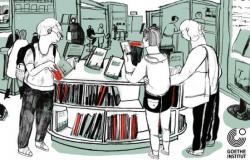The black and white lines tell the story of two children, a new road, between a playground, a laid table, a bicycle trip. It is not just a coloring book: it is a welcome message and a wish for a new beginning that will be given to the children at the Favaloro Pier in Lampedusa, the disembarkation point of migrants who have crossed the Mediterranean.
The one presented at Bologna Children’s Book Fair, is the first of the “No border books” or “books on the border”, a series created by the Lampedusa Ibby library, in collaboration with Mediterranean Hope. The book was born from an idea by Deborah Soria, representative of the library opened 10 years ago on the island, by will of Ibby, a non-profit organization whose primary objective is to promote children’s literature throughout the world . And the recipients are those children, thousands every year, who arrive at Molo Favaloro, often after a terrible journey, leaving their home and their country behind.
The Pier is the only place and time in which civilian volunteers manage to intercept migrants before they are taken to the hotspot, where they will remain for days or weeks – or even months – without being able to leave, according to the provisions which, from Covid pandemic to date, have become more stringent. The moment of disembarkation is complex, chaotic, when the parents are busy with other things, including bureaucratic and health procedures, searching for food, water, or something to cover themselves from the cold. But it is also expected. And it is also the only moment in which it is possible to “cross paths” with civil society volunteers and receive assistance and help from them.
“In those moments, even attention to the little ones becomes fundamental”: hence the idea of a gift that can be a sign of attention for children, but also an entertainment activity for them. It was not easy to put the idea into practice: “On the island you have to be careful about how to do things – explains Soria – there are procedures and situations to take into account, then it is also important to think about what is the best way to deliver a book to a child ‘passing through'”. So it was decided to give it directly to younger migrants at the pier, putting it in a small backpack, with a box of colours, so that they themselves will be able to take it with them.
The backpack is made by the women of Free Femmes Collective, group of artisans and migrants living between Medenine, Tunisia, and Italy. According to estimates from the Mediterrean Hope observatory, between 2022 and 2023, almost 6000 “under 10s” landed on the island. Giovanni D’Ambrosio, Mh volunteer, also speaks of terrible moments: “Only in the month of March there were seven missing, including two one-year-olds.”
But the Pier is a border space where there are not only tragedies and tears: “It is a cultural space full of dances, songs, story telling: there is a ‘slaughterhouse’ in a positive sense” explained the volunteer. And in this context, with a simple gesture, “we tell the children: hey, we see you. And it’s not obvious”, adds Soria.
The first “No border book” bears the signatures of Silvia Vecchini and Felicita Sala: the hope is now that other professionals will make themselves available for subsequent titles. Finally, it is possible to support the project with crowdfunding to cover the costs of the welcome kit: book, wax crayons and canvas backpack.
Tags: Lampedusa book children passing border books presented





